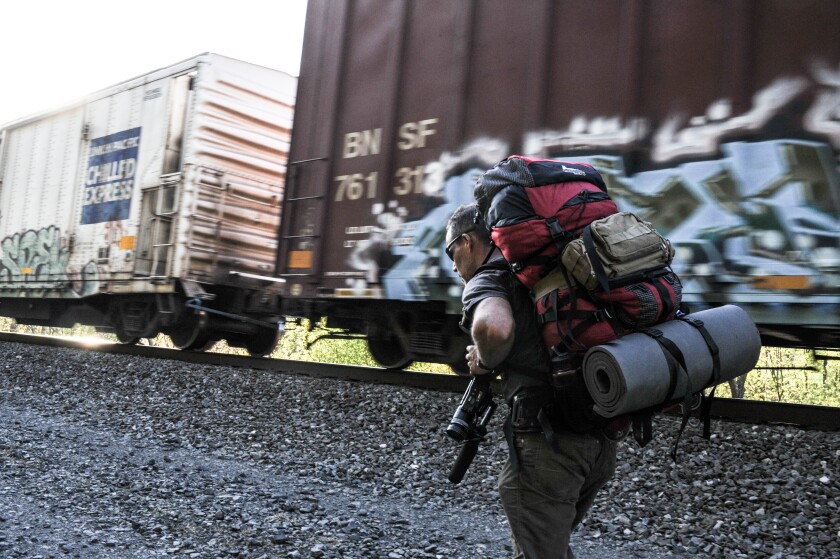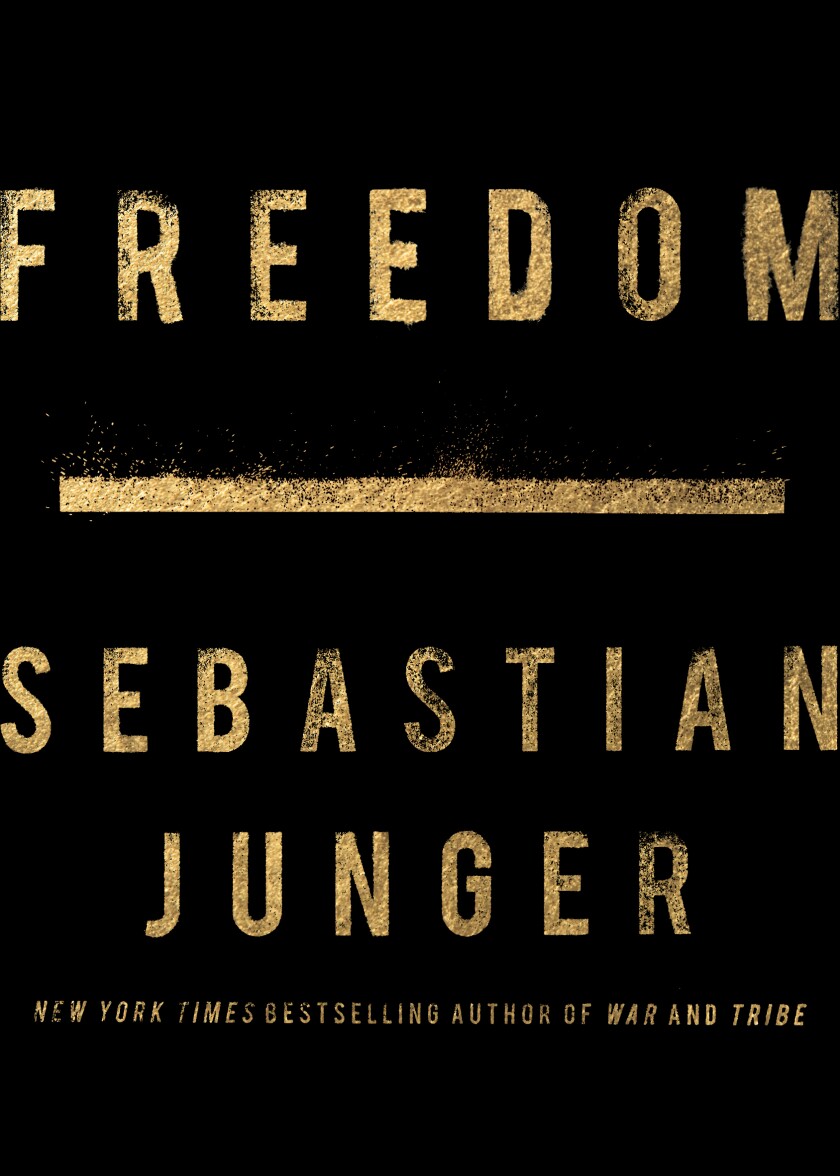On the Shelf
Freedom
By Sebastian Junger
Simon & Schuster: 160 pages, $26
If you buy books linked on our site, The Times may earn a commission from Bookshop.org, whose fees support independent bookstores.
Wanderlust can manifest in a variety of literary forms. One is the narrative of the “long walk,” which dates back to the Bible and up to recent works like Rory Stewart’s “The Places in Between.” It popped up in David Morrell’s 1972 thriller “First Blood,” in which a Vietnam veteran known only by the name Rambo has trouble reintegrating into American society and decides to travel the country until he finally comes to a dramatic confrontation with police in Kentucky (in the novel) or Washington state (in the better-known Sylvester Stallone movie adaptation).
Sebastian Junger also went to war — as a reporter in Afghanistan and Syria — and, on returning, found himself at odds with circumstances at home (the death of his father, the end of a marriage). He too hit the road as a form of solace, with very different results (though he did have the occasional run-in with law enforcement). In 2012, he began a series of long walks along train tracks, starting in Washington, D.C., and going north through cities such as Baltimore and into forested parts of Pennsylvania. Segments of that journey made their way into the 2014 HBO documentary “The Last Patrol” and now, nearly a decade later, his new book, “Freedom.”
Junger is best known for his nonfiction epic “The Perfect Storm” and the Oscar-nominated Afghan war documentary “Restrepo,” made with filmmaker Tim Hetherington, who was killed in Libya in 2011. But he has lately turned from detailed reportage to broader themes. “Freedom” is less a travelogue than a meditation on what Americans have had to endure to gift us this galvanizing idea, which in Junger’s estimation is more complicated than we might presume and easily squandered. He spoke with The Times from New York City.
You walked nearly 400 miles. Were you embarking on some kind of journey of personal transformation?
No. I wanted to get to know my country in a different way. I wanted the fraternity of other men who had been in war and were navigating the return. I’d been an athlete my whole life, and I know how psychologically purging exhaustion can be. I have to say this was the most ferociously hard thing I’ve ever done. I’ve run a 2:21 marathon, and that’s pretty hard, but it was only hard for two hours. This was day after day for weeks at a time. And we were sleeping rough and avoiding the cops and basically living as vagrants. It was totally intoxicating.
The book is vague about the time, place and dates of the walk, as well as your companions. Is that deliberate?
Initially, I had planned to take a walk with Tim. Then we were supposed to be on assignment together and I couldn’t go and he got killed, and it was very emotional for me. But I thought I should still do that walk, so for the first one I took a couple of guys from “Restrepo” with me and Guillermo [Cervera], the Spanish photographer who was with Tim in the truck when he bled out. But I intentionally left all that drama out of the book. I didn’t want it to be about us.

Sebastian Junger heading west along the Juniata River somewhere west of Duncannon, PA. 2013.
(Guillermo Cervera)
Is that why you use a collective “we” the whole way? To give us a sense that we are along on the journey with you?
Yes, but also to convey what the book is about: American history, the American landscape and — this sounds a little grandiose — the idea that everyone has of freedom. It varies from person to person, but we all have an idea of what that is. But life is a struggle, and the biggest struggle is how to live an honest, dignified life. The greatest obstacle to that is other people. It’s not predators, it’s not God, it’s us.
So is it also meant as an indictment of the idea, or certain interpretations of it?
One of the cherished ideals in this country is the idea of rugged individualism. That’s the true American spirit, the sort of square-jawed guy that goes off into the wilderness and forges his future. And that’s just nonsense. Nobody survives alone.
You offer several definitions of freedom. Many people believe freedom means simply being able to do whatever they want. You disagree with that.
Yes, that is simply ridiculous. You enjoy freedom from oppression, not freedom from obligation. Being part of a group means you will experience obligations. You cannot be a danger to other people, for example, by running a red light or killing someone.

The book goes on at some length about various fighting classes of men, from motorcycle gangs to Apache warriors, who were curtailed by rule of law. This sometimes leads to violence or even revolution. Are freedom and violence intertwined?
You are not going to have safety/freedom unless you are in a group that can defend it, and you are not going to have autonomy from that group unless there are core social norms that promote equality. What I would tell my children is that the leaders in our society need to be fair-minded people who put their responsibilities before their own interests. When you elect people who don’t do that, work for people who don’t do that and obey people who don’t do that, you’re creating circumstances for disenfranchisement.
You describe how leaders need to be with their people when the revolution begins — like James Connolly strolling the front lines during the Easter Rising of 1916. Was that a swipe at Donald Trump, who encouraged his followers to march on the U.S. Capitol on Jan. 6 and then abandoned them?
I want to give people the tools to do that analysis themselves. I will say we need to apply high standards to our political leaders. The right wing might want to apply some of these ways of looking at leadership to their own people. As might the left wing. Personally, I don’t think Hillary Clinton was a shining example of selfless leadership.
What is the greatest threat to our freedom today?
We always have to be on guard for economic and political exploitation, from the right, which produced Donald Trump, and the left, which is also enormously corrupt. But keep in mind, we still live in the freest society on Earth, make no mistake about that. For example, I’m pretty confident the Chinese rights to this book have not sold yet. I’ll have to talk to my agent, but I’m pretty sure that hasn’t happened.
window.fbAsyncInit = function() { FB.init({
appId : '134435029966155',
xfbml : true, version : 'v2.9' }); };
(function(d, s, id){ var js, fjs = d.getElementsByTagName(s)[0]; if (d.getElementById(id)) {return;} js = d.createElement(s); js.id = id; js.src = "https://connect.facebook.net/en_US/sdk.js"; fjs.parentNode.insertBefore(js, fjs); }(document, 'script', 'facebook-jssdk'));
Stay connected with us on social media platform for instant update click here to join our Twitter, & Facebook
We are now on Telegram. Click here to join our channel (@TechiUpdate) and stay updated with the latest Technology headlines.
For all the latest Entertainment News Click Here
For the latest news and updates, follow us on Google News.
